World Energy Council
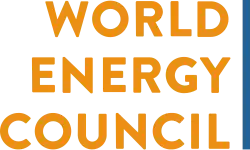 | |
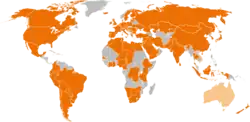 | |
| Formation | 11 July 1924 |
|---|---|
| Type | Charity |
| Legal status | Foundation |
| Purpose | Energy issues |
| Headquarters | London, United Kingdom |
Region served | Global |
| Membership | Member Committees in 92 countries + 2 direct members |
Secretary General | Angela Wilkinson |
Chair | Michael Howard |
Main organ | World Energy Congress |
| Affiliations | WEC Foundation WEC Services Limited |
| Website | www |
Formerly called | World Power Conference World Energy Conference |
The World Energy Council is a global forum for thought-leadership and tangible engagement with headquarters in London. Its mission is 'To promote the sustainable supply and use of energy for the greatest benefit of all people'.
The idea for the foundation of the Council came from Daniel Nicol Dunlop in the 1920s. He wanted to gather experts from all around the world to discuss current and future energy issues. He organised in 1923 first national committees, which organised the first World Power Conference (WPC) in 1924. 1,700 experts from 40 countries met in London to discuss energy issues. The meeting was a success and the participants decided on 11 July 1924 to establish a permanent organisation named World Power Conference. Dunlop was elected as its first Secretary General.[1] In 1968 the name was changed to World Energy Conference, and in 1989 it became the World Energy Council.[2][3]
The World Energy Council is the principal impartial network of leaders and practitioners promoting an affordable, stable and environmentally sensitive energy system for the greatest benefit of all. Formed in 1923, the Council is the UN-accredited[4] global energy body, representing the entire energy spectrum, with more than 3,000 member organisations located in over 90 countries and drawn from governments, private and state corporations, academia, NGOs and energy-related stakeholders. The World Energy Council informs global, regional and national energy strategies by hosting high-level events, publishing authoritative studies, and working through its extensive member network to facilitate the world’s energy policy dialogue. Today, the Council has Member Committees established in over 90 countries, which represent over 3,000 member organizations including governments, industry and expert institutions. The World Energy Council covers all energy resources and technologies of energy supply and demand.[5]

The World Energy Council hosts the World Energy Congress, which is the world's largest and most influential energy event covering all aspects of the energy agenda. Staged every three years, the Congress provides a platform for energy leaders and experts in all aspects of the sector to address the challenges and opportunities facing suppliers and consumers of energy. The 2019 edition took place in Abu Dhabi from 9–12 September, where it was announced that Saint Petersburg will be the host city for the next World Energy Congress in 2022.[6]
The World Energy Council's publications include annual releases like the World Energy Trilemma Index, which compares Energy security, equity and environmental sustainability on a country-by-country basis[7] (also available as an online tool[8]), as well as Insights Briefs on current energy topics such as Blockchain.[9]
Member Committees
As of March 2019 the World Energy Council has 87 member committees and 2 countries which have direct membership. Organisations in countries where the World Energy Council does not yet have an active member committee can join the Council under a direct membership.[10][11]

 Algeria
Algeria Argentina
Argentina Armenia
Armenia Austria
Austria Bahrain
Bahrain.svg.png) Belgium
Belgium Bolivia
Bolivia Bosnia
Bosnia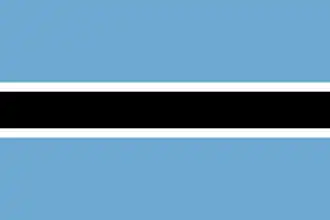 Botswana
Botswana Brazil
Brazil Bulgaria
Bulgaria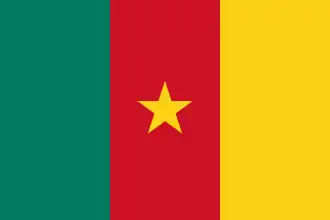 Cameroon
Cameroon.svg.png) Canada
Canada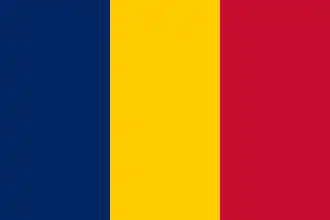 Chad
Chad Chile
Chile China
China Colombia
Colombia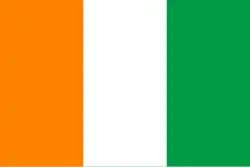 Côte d’Ivoire
Côte d’Ivoire Croatia
Croatia Cyprus
Cyprus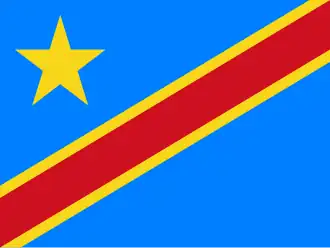 DR Congo
DR Congo Dominican Republic
Dominican Republic Ecuador
Ecuador Egypt
Egypt Estonia
Estonia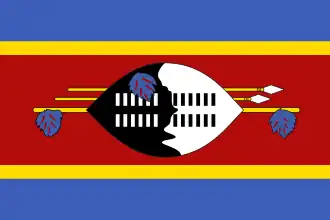 eSwatini
eSwatini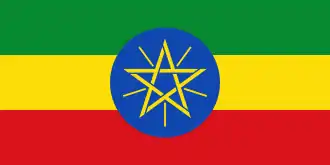 Ethiopia
Ethiopia Finland
Finland France
France Germany
Germany Greece
Greece Hong Kong, China
Hong Kong, China Hungary
Hungary Iceland
Iceland India
India Indonesia
Indonesia Iran
Iran Ireland
Ireland Italy
Italy Japan
Japan Jordan
Jordan Kazakhstan
Kazakhstan Kenya
Kenya.svg.png) Korea
Korea Latvia
Latvia Lebanon
Lebanon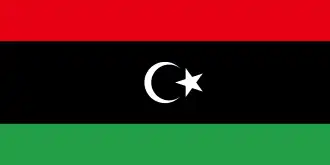 Libya
Libya Lithuania
Lithuania Malaysia
Malaysia Malta
Malta Mexico
Mexico Monaco
Monaco Mongolia
Mongolia Morocco
Morocco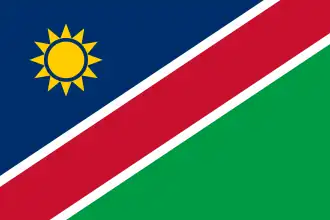 Namibia
Namibia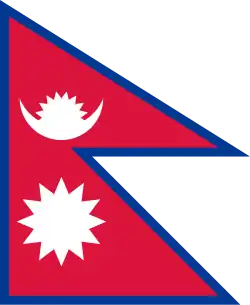 Nepal
Nepal Netherlands
Netherlands New Zealand
New Zealand Niger
Niger Nigeria
Nigeria Pakistan
Pakistan Panama
Panama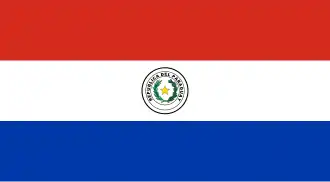 Paraguay
Paraguay Poland
Poland.svg.png) Portugal
Portugal Romania
Romania Russian Federation
Russian Federation Saudi Arabia
Saudi Arabia Senegal
Senegal Serbia
Serbia Singapore
Singapore Slovakia
Slovakia Slovenia
Slovenia South Africa
South Africa Spain
Spain Sri Lanka
Sri Lanka Sweden
Sweden.svg.png) Switzerland
Switzerland.svg.png) Syria
Syria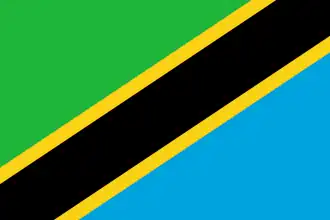 Tanzania
Tanzania Thailand
Thailand Vietnam
Vietnam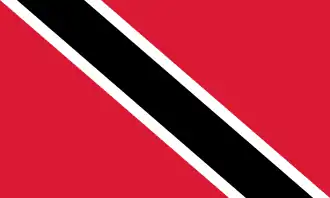 Trinidad & Tobago
Trinidad & Tobago Tunisia
Tunisia Turkey
Turkey Ukraine
Ukraine United Arab Emirates
United Arab Emirates United States
United States Uruguay
Uruguay
World Energy Congresses[12]
- London, 1924
- Berlin, 1930
- Washington, 1936
- London, 1950
- Vienna, 1956
- Melbourne, 1962
- Moscow, 1968
- Bucharest, 1971
- Detroit, 1974
- Istanbul, 1977
- Munich, 1980
- New Delhi, 1983
- Cannes, 1986
- Montreal, 1989
- Madrid, 1992
- Tokyo, 1995
- Houston, 1998
- Buenos Aires, 2001
- Sydney, 2004
- Rome, 2007
- Montreal, 2010
- Daegu, 2013
- Istanbul, 2016
- Abu Dhabi, 2019
- Rotterdam, 2024
Chairs
- 1995–1998: John Baker
- 1998–2001: Jim Adam
- 2001–2004: Antonio del Rosario
- 2004–2007: André Caillé
- 2007–2013: Pierre Gadonneix
- 2013–2016: Marie-José Nadeau
- 2016–2019: Younghoon David Kim
- 2019–2022: Jean-Marie Dauger
- 2022–present: Michael Howard
Secretaries General
- 1924–1928: Daniel Nicol Dunlop
- 1928–1966: Charles Gray
- 1966–1986: Eric Ruttley
- 1986–1998: Ian Lindsay
- 1998–2008: Gerald Doucet
- 2008–2009: Kieran O'Brian (acting)
- 2009–2019: Christoph Frei
- 2019–present: Angela Wilkinson
Officers
- MICHAEL HOWARD, Chair
- LEONHARD BIRNBAUM, Chair – Studies Committee
- IBRAHIM AL-MUHANNA, Vice Chair – Special Responsibility Gulf States & Middle East
- MATAR AL NEYADI, Vice Chair – UAE Organizing Committee, World Energy Congress 2019, Abu Dhabi
- KLAUS-DIETER BARBKNECHT, Vice Chair – Finance
- ALEXANDRE PERRA, Vice Chair – Europe
- OLEG BUDARGIN, Vice Chair – Responsibility for Regional Development
- JOSÉ DA COSTA CARVALHO NETO, Chair – Programme Committee
- CLAUDIA CRONENBOLD, Vice Chair – Latin America&Caribbean
- ROBERT HANF, Vice Chair – North America
- ELHAM IBRAHIM, Vice Chair – Africa
- SHIGERU MURAKI, Vice Chair – Asia Pacific & South Asia
- JOSÉ ANTONIO VARGAS LLERAS, Chair – Communications & Strategy Committee
- YOUNGHOON DAVID KIM, Past Chair
See also
References
- ^ Wright, Rebecca; Shin, Hiroki; Trentmann, Frank (2013). From World Power Conference to World Energy Council: 90 Years of Energy Cooperation, 1923 - 2013 (PDF). World Energy Council. p. 13. ISBN 978-0-946121-31-1. Retrieved 30 August 2017.
- ^ Wright, Rebecca; Shin, Hiroki; Trentmann, Frank (2013). From World Power Conference to World Energy Council: 90 Years of Energy Cooperation, 1923 - 2013 (PDF). World Energy Council. p. 8. ISBN 978 0 946121 31 1. Retrieved 24 July 2018.
- ^ Christian Heitmann (2023). "The Electrification of Yugoslavia 1919-1952: Ideas, Plans, Realities". In Danijel Kežić; Vladimir Petrović; Edvin Pezo (eds.). TAMING THE YUGOSLAV SPACE: Continuities and Discontinuities in Coping with the Infrastructural Challenges of the 20th Century. Belgrade & Regensburg: Institute of Contemporary History Belgrade & Leibniz-Institute for East and Southeast European Studies. pp. 67–88. doi:10.29362/2023.2794.hei.67-88.
- ^ "World Energy Council". unterm.un.org. Archived from the original on 2014-01-04.
- ^ "About the World Energy Council". World Energy Council. Retrieved 2020-03-13.
- ^ "WEC19". WEC19. Retrieved 2020-03-13.
- ^ World Energy Council (2018). "World Energy Trilemma Index" (PDF). World Energy Council. Retrieved 2022-04-24.
- ^ "WEC Energy Trilemma Index Tool". trilemma.worldenergy.org. Retrieved 2020-03-13.
- ^ "World Energy Insights Brief | Blockchain: Anthology of Interviews". World Energy Council. Retrieved 2020-03-13.
- ^ "Vietnam becomes the Council's newest direct member". www.worldenergy.org. Archived from the original on 2018-06-12.
- ^ "World Energy Council Members". World Energy Council. Retrieved 2020-03-13.
- ^ "World Energy Congress". World Energy Council. Retrieved 2020-03-13.